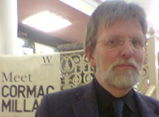

>> Readers' Notes

Questions to consider:
1. Why is it called THE GROUNDS?
2."Academics bitch, but rarely kill," Mr Quaid declares after his President is murdered. "University Presidents only die in Golden Age detective stories, where bodies are found in libraries." Can there be a realistic "campus crime" novel in the modern age, or does the outside world always have to break in?
3. People tell Quaid he talks too much. Is this true? What could you cut from his rants?
4. One reviewer calls THE GROUNDS "a novel that bears witness to the power of crime fiction for social criticism". Is that what crime fiction is for? Which bits of the book are critical of modern society? Ar4e the criticisms valid?
5. Séamus Joyce has been called "a thoroughly modern anti-hero". Wouldn't it have been easier, and more effective, to write the story with a proper hero: brave, strong and true? Are there any advantages to casting a screwed-up middle-aged worrier in the role of protagonist?
6. Apart from academics, other professions appear in the book: advertisers, artists, builders, civil servants, doctors, policemen, politicians, property developers, even writers. Which of them depart from established stereotypes?
7. Why is there a love-interest in the book (and in so many others like it)? What has love got to do with survival? (For a possible answer click here.)
8. If Finer Small Campuses are planning to take over King's College, what does that imply about globalization?
9. There are discontinuities between the various worlds portrayed in THE GROUNDS. Is that a problem?
10. What's that quotation from Shakespeare's Richard II doing at the end of the book?
A hostile reader might object:
Q. You expect me to care if some College President snuffs it?
A. Not as such. King's College is a metaphor of society. The Grounds is for anyone, in any job, who has ever felt an urgent need to kill the boss.
Q. Why is THE GROUNDS so hostile to management? Universities need reform and reorganization, same as everything else.
A. Of course they do. Clever adaptation is necessary. Stupid adaptation isn't. Management is there to make resources productive. It becomes counterproductive when it loses sight of the core values of genuine education, reduces students to the status of consumers, wastes everybody's time in silly window-dressing, and waters down a world-class product.
Q. Are all university managements equally bad?
A. No. King's College Dublin is poorly managed. Trinity College Dublin, on the other hand, has a very fine management and an excellent committee system.
Q. You're just saying that, aren't you?
A. Certainly not. These are good people: decent, fearless and above all objective. They even promoted the author of THE GROUNDS, after its publication. He's Professor Ó Cuilleanáin now.
| Home